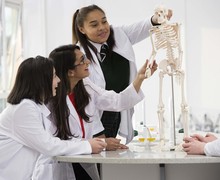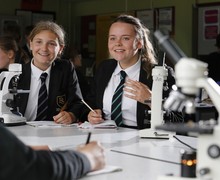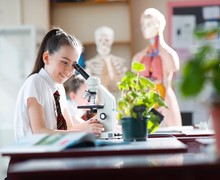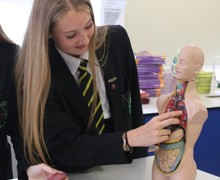Biology
Back to Subjects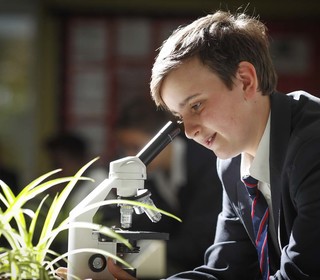 Train to Teach Biology
Train to Teach Biology
- Programme: Initial Teacher Training leading to QTS and PGCE
- Duration: 1 academic year full-time (August to July) part-time option available
- Fees: £9,535 (£8,535 QTS only) + £200 admin fee
- Bursary 2026-2027: £5,000 (subject to eligibility)
- Course Code: 2XLV
- Programme Code: 24X
Apply Here via DfE Click here for pre-application support
"I love to teach Science because it gives the students the chance to learn about the world around them from a Physical, Chemical and Biological view whilst applying two key skills, problem solving and critical thinking. The awe and wonder it can bring, coupled with the range of theory and practical skills within each lesson mean that no two lessons are the same! Being able to catch a child’s imagination within lessons makes teaching science amazing!"
Simon Harvey, Science Teacher Weydon School
Why train to be a Biology teacher?
If you are passionate about biology and enjoy working with young people, training to be a biology teacher can be a fulfilling path that allows you to share your passion and inspire your students to explore the natural world.
As a biology teacher you can play a crucial role in shaping students' understanding of important concepts such as evolution, ecosystems, and human biology, fostering critical thinking skills and scientific literacy. Educating the next generation about biological concepts is essential for addressing global challenges such as climate change, health issues, and biodiversity loss. In a dynamic classroom that often involves experiments and fieldwork, you will witness the engaging power of Biology as it nurtures curiosity and inspires students to ask questions and seek answers.
Working in a constantly evolving field, as a biology teacher, you will stay engaged with new research and discoveries, fostering your own lifelong learning.
How will i2i train you to become a Biology teacher?
Engage. Experiment. Inspire
Our engaging Biology programme will prepare you to teach a range of topics within Biology, including cell biology, genetics, ecology, evolution, and physiology. You will be mentored and taught by highly enthusiastic and experienced teachers, encouraging and supporting you to apply your knowledge and skills to create inspiring and engaging lessons.
In addition to weekly Professional Study Sessions covering different aspects of educational theory and practice, Biology trainees will have seven Science Studies days with our experienced Science Subject Tutor. You will have the opportunity to develop your subject and curriculum knowledge, your practical investigation skills within a classroom setting and learn how to safely lead a practical class. You will create resources to enhance classroom learning, and review common misconceptions amongst students within the Biology curriculum.
Entry Requirements
Alongside your passion for Biology and Science, the following qualifications are required:
- GCSE (or equivalent) Grade C/4 and above in English and Maths
- An Biology based A Level or equivalent is highly desirable
- Honours degree in a relevant subject. We will consider trainees who do not have a relevant degree if you have evidence of strong subject knowledge, experience in a related career and/or a strong relevant A Level
Next Steps and How to Apply
- Find out more and meet the team at one of our numerous Information Events
- Apply to our School Experience Programme to visit one or more of our schools to observe lessons and talk to current teachers
- Find out what Funding and Financial support is available
- Complete our Pre-Application Form to receive guidance and support with your application
- Submit your application via the Department for Education Apply Portal
- Provider code: 24X
- Biology Programme code: 2XLV
Places on our teacher training programmes are highly sought after and so you should submit your application as early as possible. Our team is here to help you navigate this process and to answer any questions you have.

